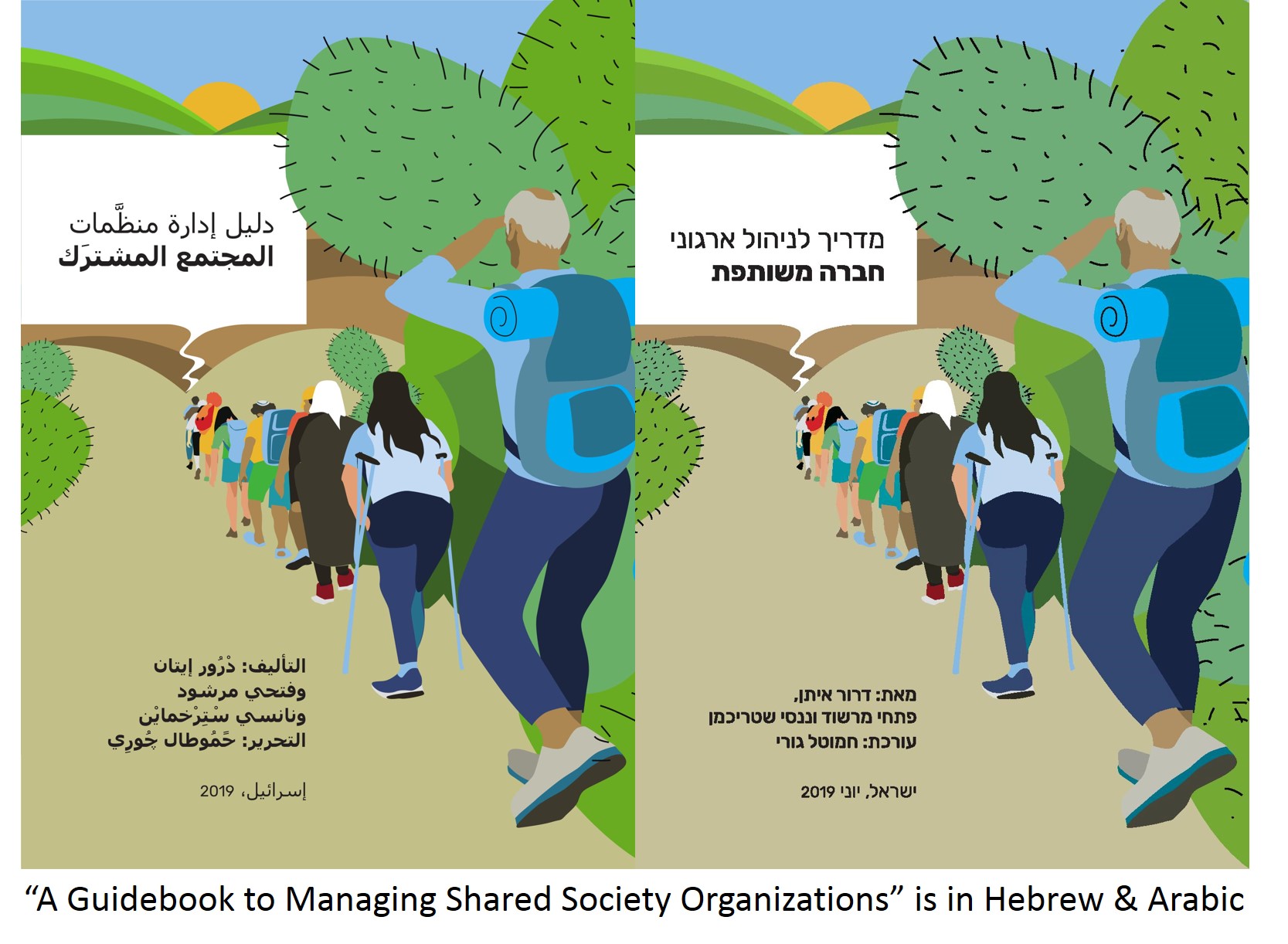 With more shared society organizations in Israel working under joint Jewish-Arab leadership, three Israeli leaders active in the field have published a guidebook to the often complicated and sensitive realities of this model.
With more shared society organizations in Israel working under joint Jewish-Arab leadership, three Israeli leaders active in the field have published a guidebook to the often complicated and sensitive realities of this model.
“A Guidebook to Managing Shared Society Organizations,” the first manual of its kind, was written by Dr. Nancy Strichman, Dror Eitan and Fathi Marshoud; edited by Hamutal Gouri; and published in Hebrew and Arabic. The guidebook was presented at a recent gathering at Oranim College where leaders of more than two dozen of these organizations shared insights, challenges and best practices of managing these jointly-run endeavors, and noted their appreciation for the book’s hands-on approach and practical emphases.
Based on years of fieldwork with directors of some of these leading organizations, including the Abraham Initiatives, AJEEC-NISPED, Givat Haviva, Mahapach-Taghir, Sikkuy and Tsofen, the guidebook seeks “to provide the leaderships of shared society organizations with the approaches, perceptions and tools that have been tested and tried in the field, and which can help them work effectively to achieve their common goals, to successfully address the ever-changing complex reality and to enhance their ability to influence and lead,” the authors wrote. It also aims to identify and discuss “the dilemmas and main insights that stem from the work of shared society organizations, in a way that will enrich the public discourse about shared society in Israel – with its challenges and opportunities.”
Below are some of the major issues discussed in the guidebook and during the seminar:
- Organizational Vision: A jointly accepted vision is a major tool in enabling social change organizations to advance their goals. However, joint organizations face the challenge of formulating a vision that will be approved by both the Jewish and the Arab members of the organization. Participants in the meeting considered these issues:
- Is a long-term vision, which is 100% detailed and universally accepted, possible? Is it necessary?
- Without such a vision, is it possible to advance social change through a shared organization while working only incrementally, on jointly agreed-upon immediate goals?
- Does avoiding a shared vision serve to maintain the status quo of existing power relations?
- How do organizations find the balance between an ideological backbone and organizational flexibility?
- The guidebook includes practical recommendations on formulating an organizational vision, including important stakeholders in this process, and using it constructively to advance the joint organization’s goals in the field.
- Social and Human Capital: Shared society organizations work in a constantly changing landscape and often invent new concepts and learn as they go along. Therefore, the guidebook recommends soliciting input from the staff members who are closest to the field, as well as from additional stakeholders, to create an atmosphere of curiosity and an ongoing learning process. The authors write that this process also creates a feeling of ownership by all staff, an important component in motivating staff who work in demanding environments. Participants discussed how to:
- Ensure equal representation of Jews and Arabs among external stakeholders and in strategic discussions.
- Increase the number of women around the table.
- Create an environment in which the different identities and concerned are present, respected and heard, through the use of both languages, maximum transparency, and cultural and religious sensitivity.
The manual includes recommendations on how to nurture the joint Jewish and Arab staff, managing hiring and firing processes, and human capital development processes.
- Power Dynamics: Shared society organizations grapple with ensuring equitable leadership structures and decision-making processes, weighing Jewish-Arab and state-minority relations in Israeli society. Participants discussed becoming more aware of the power relations within shared organizations, how to ensure transparency vis-à-vis staff members so the joint management is perceived as such, how to utilize external consultants and how to ensure efficiency as joint management can be time-consuming. The guidebook points out the challenge of balancing professional processes and work ethics with flexibility and empathy.
- Addressing external crises and tensions: Events of national concern such as security crises, military operations and terror attacks present significant challenges to the work of shared society organizations, and to their internal cohesion and functioning. The guidebook includes a set of recommendations on how to address crises that stem from such events, via intentional, conscious efforts to discuss them and acknowledge the different sensitivities they raise and the different backgrounds and affiliations of staff.
- Political relevance: The seminar included a discussion about whether and how the co-management model could be relevant to Jewish-Arab political partnership, and on whether and how the field of shared society organizations could also become one of political action.
- Relevance to other shared spaces and mixed organizations in Israel: Participants voiced their support for the research and writing of the guidebook, which amalgamates knowledge and insights from the field into a single, practical booklet. In looking ahead, the discussion centered on the fact that numerous spaces and organizations in Israel are becoming increasingly mixed, including universities, large companies, hospitals and even some segments of the civic service. While most of these organizations are not co-led, and while Arabs are often still a relatively small minority, especially in higher-level positions, participants discussed how insights and best practices included in the guidebook could be helpful to managing these organizations as well.
 With more
With more